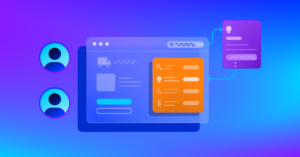
Your help desk often serves as a first point of contact for many customers. If customers have a bad experience, they may not return and many, share it with others. The average American tells up to 15 people about a bad customer experience.
On the flip side, give your customers stellar service and they’re likely to do business with you again. Fifty-two percent of customers say that they have purchased again from a company after a positive customer service experience.
Your help desk directly impacts customer satisfaction and retention rates and, ultimately, your bottom line. It costs 6-7 times less to retain existing customers than acquire new ones! So it’s vital that you continuously seek to improve your help desk service.
6 Ways To Make Your Help Desk More Efficient
Some common complaints customers express when it comes to poor customer service are:
- Slow service.
- Unknowledgeable help desk agents that can’t provide solutions immediately.
- Being passed around to different departments.
- Getting lost in the system with no follow up or feedback.
Recognize some of these issues in your help desk? Here’s how to fix it.
1. Invest in staff training
Your help desk agents should be friendly, welcoming and helpful and learn how to handle difficult and irate customers.
They should be trained in verbal and written communication techniques. For example, speaking to a customer on the phone versus engaging in a live chat. Customers respond more positively to an enthusiastic call center agent and a live chat should be conversational, not robotic.
All help desk must undergo company training on all aspects of the business so that they can provide customers with information on products and business processes immediately. They should also be trained in how to represent your brand’s personality.
2. Speed up your response times
In a survey by Arise, nearly two-thirds of respondents said they will hang up if a call wait time is longer than two minutes; and 1 in 3 won’t call back. Similar frustrations occur when emails, online contact forms and text messages are not answered promptly. Most customers expect a response to emails and online forms within 24 hours.
If you’re struggling with slow service, you could be losing customers. Hire more staff to speed up your service, upgrade to a more efficient CRM system, and use chatbots to provide automated responses when agents are unavailable.
3. Install help desk software
One of the best ways to speed up your customer service is to install an efficient help desk system. Not all help desk software is created equal. Look for the following:
- Organized workflow. Agents should have a snapshot of the customer’s profile and outstanding tickets that require attention.
- A multi-channel ticketing system that automatically converts incoming requests from multiple channels — be it email, phone, or social media — into a customer service ticket.
- Integration with other tools and apps, like e-commerce software. You’ll be able to assist customers with sales and product queries immediately.
- Robust reporting so you can analyze your metrics to see where inefficiencies lie and develop strategies to overcome them.
4. Aim for first-contact resolution
Once you’ve upgraded your CRM and help desk software and your staff are properly trained, they should be better equipped to resolve queries at first contact.
If an agent needs to investigate further, your help desk system should notify and remind them to follow up. If a query cannot be resolved immediately, have an escalation plan in place so that agents know where different types of queries should be directed.
5. Add a self-service knowledge base
Customers like having their questions answered without ever having to pick up a phone. That’s why self-service knowledge systems are such a great addition to your customer service toolkit. This can be a “frequently asked questions” section, a list of guides or tutorials, or a resource library.
If you have multiple resources, make sure you structure your knowledge base in a methodical way and include a search function.
6. Put a contingency plan in place for when a crisis arises
Your help desk strategy should include a contingency plan for when a crisis occurs, be it a natural disaster, power outage or a PR crisis.
If you are busier at certain times of the year, anticipate an increase in sales after a promotion, receive a flood of complaints about a defective product, or your office suffers damage from a natural disaster, have a plan in place to handle it. This can include:
- Temporarily adding more manpower to your call center.
- Setting up agents to work from home.
- Emailing customers to inform them about the situation and the steps you’re taking to remedy it.
A great product attracts a customer but doesn’t necessarily keep them. Good customer service does. Happy customers tell others how great your company is and they keep shopping. That type of brand advocacy and loyalty is invaluable.

![HubSpot's 2025 State of Blogging Report [Data from 500+ Marketers]](https://www.liveseo.com/wp-content/uploads/2025/02/HubSpots-2025-State-of-Blogging-Report-Data-from-500-Marketers.webp-300x300.webp)


